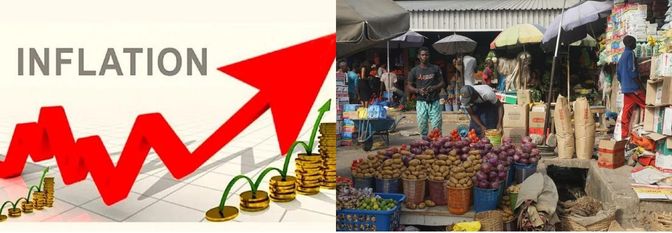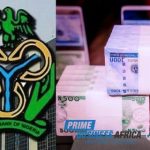Economic experts have called on authorities to adopt a multi-sectoral approach in tackling high inflation in Nigeria.
According to the latest data released by the National Bureau of Statistics (NBS) Nigeria’s headline Inflation rate for December 2023 was 28.92 per cent reflecting an increase of 0.72 per cent points from 28.20 per cent in November 2023. On a year-on-year basis, the headline inflation rate was 7.58 per cent higher compared to the rate recorded in December 2022, which was 21.34 per cent.
Join our WhatsApp ChannelThe report shows that the food component was a major contributor with the Food Inflation rate reaching 33.93 per cent in December 2023, from 32.84 per cent in November 2023.
Nigeria has over the years grappled with economic downturn with the headline inflation rate on a continuous spike. From 21.82 per cent in January 2023, it surged to 28.9 percent in December.
READ ALSO: Blame Naira Depreciation For Nigeria’s Highest Inflation In 21 Years – Experts
Commenting on the high cost of things in the country currently, Paul Alaje Chief Economist and Partner at SPM Professional said: “Food prices are the worst now. The factors are insecurity, poor organisation, logistics etc. Core inflation is worse off as well.”
Speaking in an interview with Prime Business, Senior Lecturer, Department of Economics, Nigeria Delta University, Dr Wisdom Krokei, said Nigeria’s high inflation rate is caused by a couple of factors and needs to be tackled using multiple approaches.
He said the fact that the food inflation rate hit 33.93 per cent in December from 32.84 per cent in November is not surprising because December is a festive season and expectedly prices would rise due to high demand for consumer goods.
He, however, explained that the major cause of inflation in the country is the foreign exchange crisis and logistics costs.
On the part of logistics, he cited the case of fuel subsidy removal done last year which led to a sudden hike in the price of the premium Motor Spirit (PMS) leading to a jump in transport fares across the country.
These he said, have affected the cost of production and services.
READ ALSO: What Govt Should Do To Rein In Inflation
“FX is a key determinant for inflation in Nigeria. A high FX rate requires more money to exchange the Dollar, thereby bringing about imported inflation as well, due to heavy importation as we are witnessing today,” Dr Krokei told Prime Business Africa.
“Transportation costs are also a major issue, particularly this rise in fuel price, which has given rise to the transportation costs. Once there is a high cost of transportation, that will also affect production itself. Production costs will rise. Once production costs increase it will definitely affect the supply of goods and services and therefore create a supply lag and the demand for a particular commodity will outweigh the supply of such commodity and that will give rise to the high inflation we are experiencing now.”
The don said that if the policy reforms embarked on by the federal government are well implemented, though with people facing challenges in the interim, the economy will improve and help in slowing down inflation in the long run.
He called on the government to use monetary policy to see how prices of things can be controlled by controlling money supply, and credit facilities.
“I will also suggest that in order to cut down inflation rates, government should also look inwards to see how it can reduce also reduce its spending, particularly the recurrent expenditure,” he stated.
He also emphasised the need to tackle insecurity and increase efforts towards boosting domestic production to reduce the country’s dependence on imports.
Dr Tope Fasua, special adviser to the president on Economic Affairs said tackling inflation cannot be done using only monetary policy measures.
He also advocated the use of a multisectoral approach towards tackling inflation in 2024 and going forward.
He said that the Central Bank of Nigeria has promised to work towards slowing down inflation numbers, but there are other non-monetary issues that are driving inflation.
Apart from FX crisis, logistics costs and insecurity, Fasua identified other factors contributing to inflation such as the quest for profit (profit-driven inflation), reduction in the quantity of product contents over time (shrinkflation), and arbitrary setting of prices by suppliers upon perceiving an increase in input costs.
“We are looking at a multisectoral approach in tackling inflation in 2024 and going forward,” Fasua stated during an interview on Channels Television Sunrise Daily programme on Tuesday.
On managing prices of goods outside the use of monetary policy measures, the economic expert said it can be done by engaging market leaders, associations such as chambers of commerce and Manufacturers Association (MAN) among other groups to avoid profit-driven inflation.
He cautioned that increasing the interest rate by the monetary authorities to control inflation as done in some other climes may not work in Nigeria because of the nature of the economy.
“We need to work in Nigeria. I can tell you that there are sometimes it may work the opposite. If you increase the interest rate and manufacturers say ‘look, this is cost of goods. The cost of producing has increased because the interest rate with which I am borrowing from the bank has increased, therefore I am increasing my price,’ it is logical. That also drives inflation,” Fasua stated.
He added that everyone has a role to play in tackling inflation not just a case of Central bank increasing interest rate. “If you keep increasing the interest rate, that also has its implications in terms of slowing growth in the economy as a whole.”
Victor Ezeja is a passionate journalist with seven years of experience writing on economy, politics and energy. He holds a Master's degree in Mass Communication.

















Follow Us